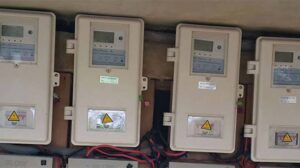The Electricity Meter Manufacturers Association of Nigeria (EMMAN) says President Muhammadu Buhari’s approval of one year deferment of the 35 percent import adjustment tax (levy) imposed on fully built unit (FBU) electricity meters HS Code 9028.30.00.00 under the 2019 fiscal policy measures for the implementation of Economic Community of West African States (ECOWAS) common external tariff (CET) 2017 – 2022 will only encourage importation of the items, thereby developing the economy of other countries.
Speaking as a member of the Original Equipment Manufacturer (OEM) in the downstream of the power sector, Mr Kola Balogun, Chairman of Momas Electricity Meters Manufacturing Limited (MEMMCOL), said the removal is an indication that the government is more disposed to favour importation to the detriment of local production.

“The implication of this is that over 600million US dollars would be exported to China to import the approved 3million meters. This means we would further be developing another country’s economy and continue to increase unemployment, poverty and underdevelopment in our country.
“We are bold to emphatically say that we at MEMMCOL, have the local capability to bridge the metering gap if the right policy is put in place.
“This can be by way of financial intervention by the government whereby certain agreed percentage of the cost of meter supply would be advanced to us like the importers do with the Chinese and upon completion of installation balance payment would be made to us. We do not even mind to furnish a bank guarantee as our own commitment in such deal”, Balogun said.
According to the President, Nigeria Consumer Protection Network, Kunle Olubiyo, there is an urgent need for the Federal Government of to put in place a strict regime of sanctions against off-takers who have deliberately refused to accept indigenous technology and made in Nigeria pre-paid meters.
“As important as the vexed issue of metering is, there are other variables and extraneous factors that if not eradicated or boldly addressed once and for all, Nigerian electricity market shall remain an elusive growth and a vicious circle of stagnation.
“As a matter of fact, what we need now is a review downward of the presently discriminatory pricing of gas pricing methodology and disparity in the gas pricing business model with different pricing options for different Off-takers.
“Electricity consumers are increasingly being made to pay for fixed cost, padded cost, over bloated indexes of hyper-inflated cost of production of each Unit of electricity measured in kilowatt hour etc,” Olubiyo added.
EMMAN however appealed to the Federal Government to review its levies on imported electricity meters to promote full local content in the production of pre-paid meters.
EMMAN believes the approval is an incentive for mass importation of pre-paid meters as against upscaling of local production.
